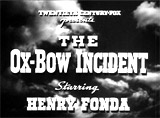
|
The Ox-Bow
Incident (1943)
In director William Wellman's "Western noir"
adaptation of Walter Van Tilburg Clark's novel - a grim study of mob
rule based on a true story:
- the film's opening: in 1885 Nevada, two drifter-cowpokes
Gil Carter (Henry Fonda) and Art Croft (Harry Morgan) rode into
the town of Bridger's Wells; they watched the formation of a frenzied,
angry vigilante, frontier-justice posse (lynch mob) when an unverified
report arrived that a local rancher named Kinkaid had been shot
dead by cattle rustlers
- the ignored pleas of white-haired, level-headed storekeeper
Arthur Davies (Harry Davenport) that they cautiously not take any
extreme actions until Sheriff Risley (Willard Robertson) was notified
about the alleged murder of Kinkaid:
"Don't let's go off half-cocked and do something we'll be sorry
for. We want to act in a reasoned and legitimate manner, not like a
lawless mob"
- the blood-thirsty posse was led by stern-faced, sadistic
ex-Confederate officer Major Tetley (Frank Conroy), and others including
his reluctant son Gerald Tetley (William Eythe), Kinkaid's loyal
buddy-ranchhand Jeff Farnley (Marc Lawrence), rough female Jenny "Ma" Grier
(Jane Darwell), power-hungry, sadistic bully, Deputy Sheriff Mapes,
aka "Butch" (Dick Rich), and bearded, drunken town bum
and redneck Monty Smith (Paul Hurst)
|
Members of Assembled Posse
|
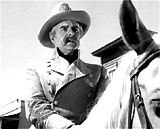 Major Tetley (Frank Conroy)
Major Tetley (Frank Conroy)
|
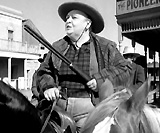 Jenny "Ma" Grier (Jane Darwell)
Jenny "Ma" Grier (Jane Darwell)
|
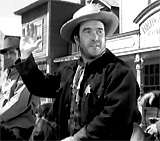 Deputy Sheriff Mapes aka "Butch" (Dick
Rich)
Deputy Sheriff Mapes aka "Butch" (Dick
Rich)
|
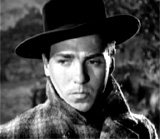 Gerald Tetley (William Eythe)
Gerald Tetley (William Eythe)
|
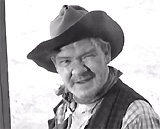 Monty Smith (Paul Hurst)
Monty Smith (Paul Hurst)
|
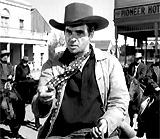 Jeff Farnley (Marc Lawrence)
Jeff Farnley (Marc Lawrence)
|
- in the film's climactic conclusion, three accused
and suspected homesteaders were led to the base of a gnarled tree
for a hanging, where three nooses had been hanging prominently
and ominously throughout the previous sequence
|
Three Accused Suspects
|
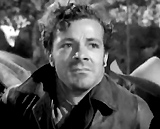 Rancher/Family Man Donald Martin
Rancher/Family Man Donald Martin
(Dana Andrews)
|
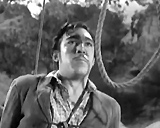 Stoic, Defiant Mexican Juan Martínez
Stoic, Defiant Mexican Juan Martínez
(Anthony Quinn)
|
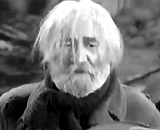 Confused and Senile Old Man: Alva 'Dad' Hardwicke
(Francis Ford)
Confused and Senile Old Man: Alva 'Dad' Hardwicke
(Francis Ford)
|
- the scene of the "trial" at the hanging
tree with only circumstantial evidence; cowpoke Gil Carter witnessed
the sham trial and forcefully stated to the lynch mob: "Hangin's'
any man's business that's around...Hangin' murderers is one thing,
but to keep guys you don't know for sure did it standing around
sweatin' while you shoot your mouth off, that's another" -
but was restrained and silenced by the vigilante mob
- Donald Martin (Dana Andrews) pleaded with Major Tetley
for reconsideration, as he was about to be strung up:
"Justice? What do you care about justice? You don't even care
whether you've got the right men or not. All you know is you've lost
something and somebody's got to be punished...You butcher!"
- the actual hanging - at the moment of their execution,
the victims, with ropes around their necks, were placed on horses
that were whipped out from underneath them; just beforehand, reluctant
son Gerald Tetley (William Eythe) received a vicious gun butt in
the face from his father for refusing to whip one of the horses
- the shadows of the three men's bodies were seen swinging
on the ground; to "finish 'em," Jeff Farnley fired bullets
from his rifle into all three men to ensure that they were dead;
the posse left as the town's unofficial preacher/hymn-singer Sparks
(Leigh Whipper) sang about each of the three souls journeying through
the Lonesome Valley and standing alone before their Maker
- on the way back to town, the posse met Sheriff Risley
who was shocked to learn what they had done: "Larry Kinkaid's
not dead!"; a wounded Kinkaid was being treated by a doctor
and they "caught the fellas who shot him too"; the Sheriff
condemned them with contempt in his voice: "God better have
mercy on ya. You won't get any from me"
- the sequence of stiff-backed Major Tetley shooting
himself (off-screen) behind his locked door, after listening to his
disgruntled son Gerald outside the front door on the porch, who had
just finished criticizing him for being a weakling: ("I saw
your face. It was the face of a depraved, murderous beast. There
are only two things that have ever meant anything to you: power and
cruelty. You can't feel pity. You can't even feel guilt. In your
heart, you knew those men were innocent, yet you were cold crazy
to see them hanged, to make me watch it. I could've stopped you with
a gun, just as any other animal can be stopped from killing, but
I couldn't do it because I'm a coward. Heh, heh, heh. Aren't you
glad you made me go, father? Weren't you proud of me? How does it
feel to have begot a weakling, Major Tetley? Does it make you afraid
there may be some weakness in you too, that other men might discover
and whisper about? Open the door, Major! I want to see your face.
I want to know how you feel now!") (gunshot)
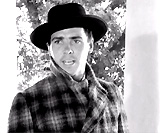 Harsh Words of Son Gerald
Harsh Words of Son Gerald
|
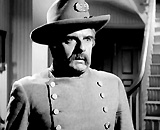 Major Tetley Listening
Major Tetley Listening
|
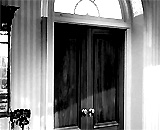 Door Behind Which Major Tetley Killed Himself
Door Behind Which Major Tetley Killed Himself
|
- the heartbreaking final scene in the town's saloon,
of Gil Carter's posthumous reading of the letter of one of the
lynched victims, Donald Martin, written to his wife, after the
three victims had been declared blameless:
"...A man just naturally can't take the law into his own hands
and hang people without hurtin' everybody in the world, 'cause then
he's just not breakin' one law, but all laws. Law is a lot more than
words you put in a book, or judges or lawyers or sheriffs you hire
to carry it out. It's everything people ever have found out about
justice and what's right and wrong. It's the very conscience of humanity.
There can't be any such thing as civilization unless people have
a conscience, because if people touch God anywhere, where is it except
through their conscience? And what is anybody's conscience except
a little piece of the conscience of all men that ever lived? I guess
that's all I've got to say except - kiss the babies for me and God
bless ya. Your husband, Donald"
- the film's last lines were spoken by Gil to Art as
they saddled up - he was determined to deliver the letter personally:
"He said he wanted his wife to get this letter, didn't he? Said
there was nobody to look after the kids, didn't he?"
|
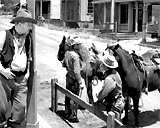
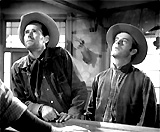
Two Cowpokes' Arrival in Town
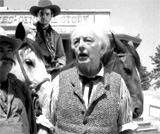
Protest by Shopkeeper Arthur Davies (Harry Davenport)
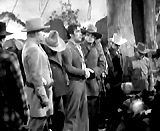
The "Trial"
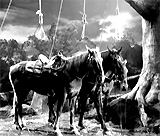
Three Hanging Ropes and Three Horses
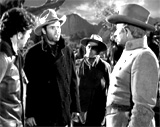
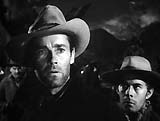
Gil Carter's Defense: "Hangin's' any man's husiness
that's around"
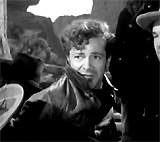
Martin: "What do you care about justice?"

Shadows of Three Hanged Men
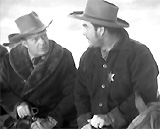
Sheriff Risley to His Deputy: "Larry Kinkaid's
not dead!"
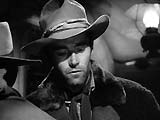
Gil Carter's Outloud Reading of Martin's Letter
in the Town's Saloon
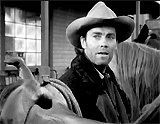
Carter's Final Lines of Dialogue
|













